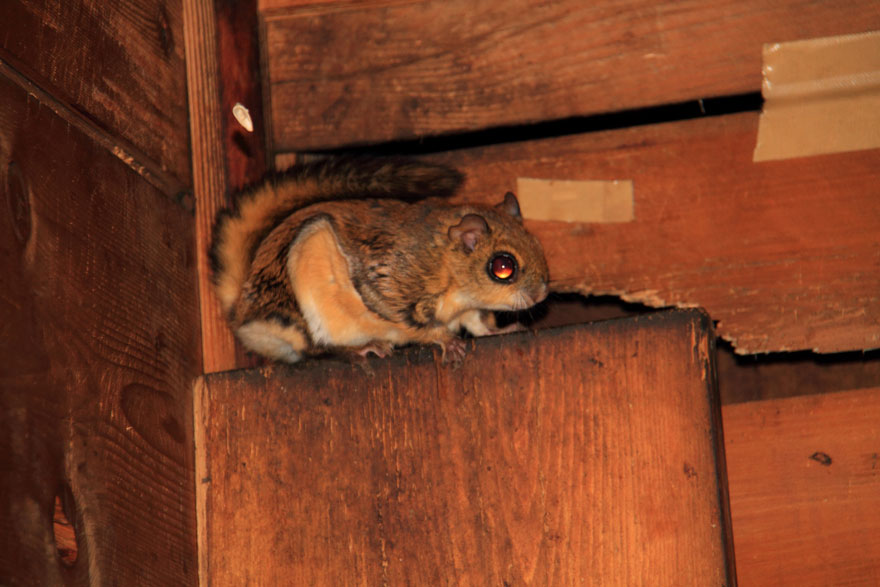- SPECIAL DISCOUNT
- 10% OFF on Full Home Recommendations + Free Consultation
- Excludes insulation services
- Contact Us
- Must mention at the time of booking
What Kind Of Damage Can Squirrels Do In Your House Attic In Denver, CO?

Squirrel infestations are a common issue for homeowners in Denver, CO. These agile rodents often seek shelter in attics. But how do squirrels in the attic damage your house, exactly?
They are known for chewing through materials, contaminating spaces with their droppings, causing structural damage, and more. Understanding the risks and knowing how to address these infestations can save you time, money, and stress.
This guide will walk you through the types of serious damage they can cause, and how squirrel control services manage and prevent these issues effectively.
Types of Damage by Different Squirrel Species
Different types of squirrels can present distinct problems to your properties. Flying squirrels, being nocturnal, often glide into your attic spaces and wall voids with ease, creating hidden issues.
Grey squirrels, highly adaptable, thrive in urban and suburban areas. Known for their acrobatic abilities, they can frequently reach into attics, gardens, and bird feeders, causing significant damage to your roof space, ornamental plants, and food crops. Denver neighborhoods with mature trees and bird feeders tend to see repeated roofline entries unless branches are trimmed back.
Ground squirrels and chipmunks, which burrow extensively, can destabilize attics, lawns, and foundations. Worst of all, these tunnels provide even more entry points for other pests, thereby compounding your infestation problem. Monitor for small sink spots or soil voids near patios and steps.
Chewing Damage
One of the most concerning aspects of a squirrel infestation is the damage caused by their incessant chewing. Squirrels need to gnaw continuously to keep their teeth sharp and manageable, and unfortunately, your home’s materials often become their target. Fresh gnaw marks look pale on wood and newly exposed copper appears bright where wire sheathing is chewed.
Electrical wiring is particularly at risk. Chewed wires can lead to short circuits, power outages, and even electrical fires, posing a significant safety hazard to your household. Hotspots include around can lights, junction boxes, and along flex duct hangers where squirrels travel.
Squirrels can also cause structural damage. They frequently chew on wooden beams and supports, which can weaken the structural integrity of your attic over time. Roof deck edges and fascia boards are frequent targets near entries. This damage can be expensive to repair and, if left unaddressed, may lead to more severe issues within your home’s structure.
Nesting Damage and Reproduction Risks
Insulation and ventilation systems are not immune to squirrel damage either. Squirrels in your attic can cause significant damage by using nesting materials that destroy insulation and ductwork. Torn batt edges and plenum tape damage reduce HVAC efficiency.
They often tear apart insulation to build their nests, which reduces its effectiveness and will result in higher energy costs. Additionally, they might use materials that block ventilation systems, disrupting airflow and potentially leading to moisture buildup and mold growth. Blocked soffit vents can create ice dam risks during Front Range cold snaps.
Not to mention, squirrels reproduce very quickly, which compounds the damage over time. A single pair of squirrels can give birth to multiple litters annually, resulting in a rapidly growing population. Plan exclusions around local breeding windows to avoid trapping young inside.
Once a population is established, removing them becomes that much more challenging. The longer they stay, the more they adapt to the space, making eradication efforts more complex and time-consuming.
Contamination and Health Risks
Accumulation of droppings and urine in your attic can bring about unpleasant odors that permeate your home. More seriously, these droppings can foster mold and mildew growth, which pose health risks, especially for those with respiratory conditions.
Squirrels can also spread diseases such as leptospirosis and salmonella through their waste. In addition, they often carry parasites like fleas, ticks, and mites, which can infest your home and affect your pets and family. Deodorization and insulation replacement help remove scent trails that attract future wildlife. Proper clean-up and sanitation are vital to mitigating these health hazards and maintaining a healthy living environment.
Effective Squirrel Control Solutions at Best Pest & Wildlife Control
Squirrels can indeed cause considerable damage when they infest your attic, from chewing on electrical wires and structural beams to contaminating the space with droppings and urine.
They also cause significant destruction through their nesting and reproductive habits as well as pose health risks to your family. Taking preemptive steps will help you protect your home.
At Best Pest & Wildlife Control, we offer in-depth squirrel control and wildlife removal services in Colorado and beyond. Our repair and remediation services along with our professional measures for pest protection can address your existing problems plus prevent future infestations.
Get in touch with us today at 866-692-1793 to get started.
CONTACT US FOR A FREE QUOTE
Feel free to give us a call or send us an email with any questions or comments you have.
